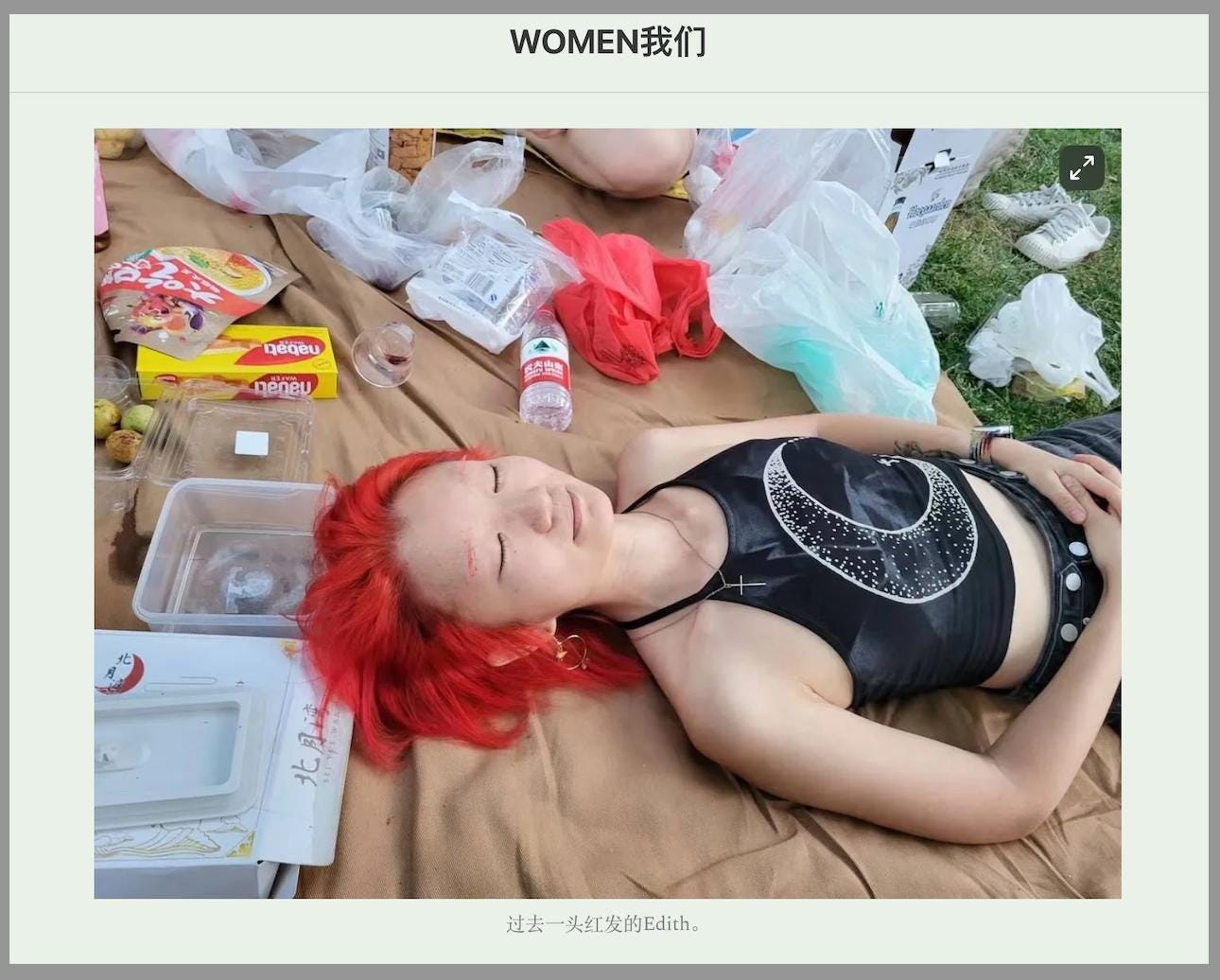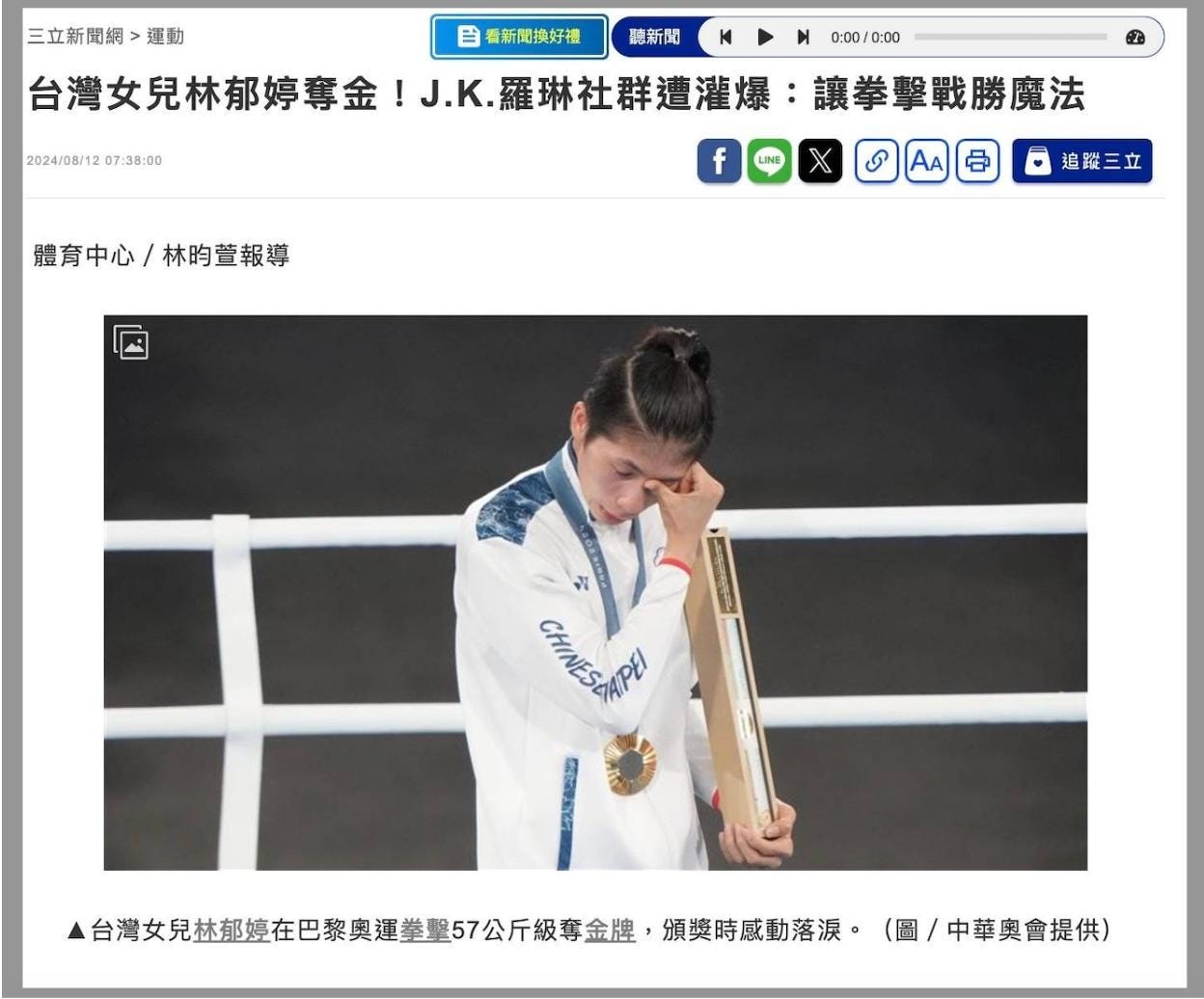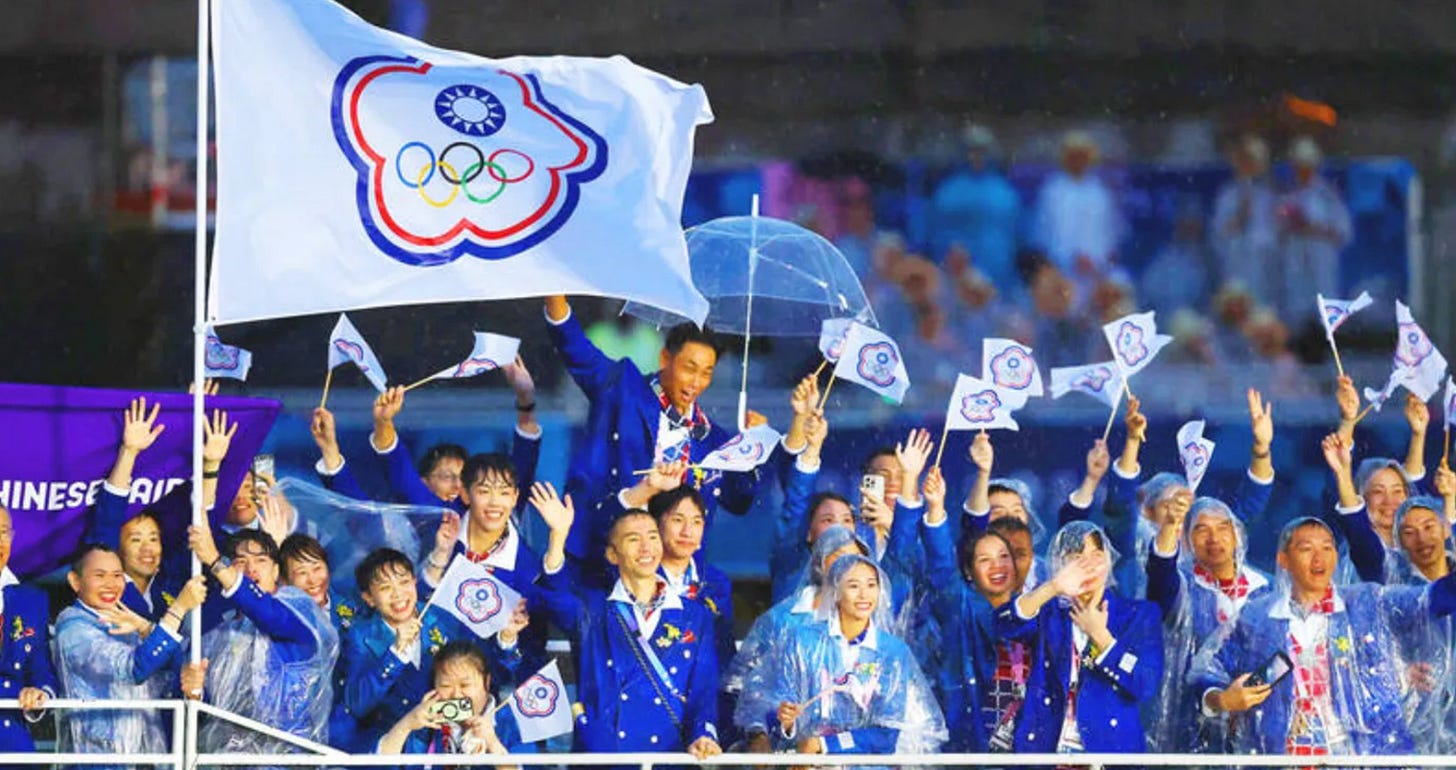INTERSECTIONS/ August 15, 2024
A rundown of issues, analysis, and must-read stories about women and female representation in the Sinophone landscape.
Dear subscribers,
Welcome to the second edition of Intersections, a monthly bulletin by Lingua Sinica dedicated to coverage of women’s issues and feminism in the Chinese-language media space.
From Paris to Beijing and Taiwan this month, we explore stories that have captured global attention, including Lin Yu-ting's triumph at the Olympics. We examine how personal traumas can be addressed through theater and discuss the backlash faced by one of Taiwan's most prominent news outlets following allegations from former employees.
As I said in my last bulletin, I hope these stories can prompt conversation and interaction. I welcome your suggestions about new outlets, stories, perspectives, or contributions, anything from films and books to short videos. Please reach out.
Dalia Parete
CMP Researcher
VOICES OF RESILIENCE
The steep price of speaking out for the marginalized
In late 2022, Edith (郭艺), a young queer activist from China’s Xinjiang region, was arrested under the dubious charge of "picking quarrels and provoking trouble" (寻衅滋事”) after she posted messages about freedom and dignity in public restrooms (see below). Edith spent four months in detention before being released in February 2023.
In a personal and touching interview with WOMEN (我们), an online community that describes itself as "writing a first draft of history free of censorship," Edith opens up about her activism rooted in her experiences as a minority and LGBTQ individual from Xinjiang, underscoring the challenges faced by marginalized communities in China. She shares the events leading up to her arrest, her experiences in detention, and her decision to leave Beijing for further studies abroad.
“As a lesbian from an ethnic minority who grew up in Xinjiang, I would naturally care about marginalized people.”

IN MOTION
Healing through art
In a recent article, The News Lens (關鍵評論網), a Taiwanese online news outlet, highlighted the inspiring journey of the Barefoot Alice theater troupe (光腳的愛麗絲), a performance group comprised of women who have survived sexual violence and domestic abuse.
Inspired by American playwright Eve Ensler's work The Vagina Monologues (陰道獨白), the troupe adapted local gender narratives into their performances, creating a Taiwanese version titled One Person, One Story Theater (一人一故事劇場), with guidance from drama therapist Josephine (喬色分). The members of Barefoot Alice embrace their connection to the earth by performing barefoot, symbolizing their vitality and resilience. And like the titular characters in Lewis Carrol’s Alice in Wonderland, the members of Barefoot Alice all undergo their own personal journeys towards healing and transformation, using the power of performance to turn their pain into a source of strength.
“I’ve gone from being a victim to someone who helps others,” says group member Hui Hui (蕙蕙). “When women stand up and speak out for themselves, it’s the most beautiful and powerful thing.”
The group will hold an opening ceremony in Taipei on the evening of October 15. Visit their website for more information if you’re interested.
OFFICIAL FRAMES
The CCP’s POV on women
Founded in 1984, China Women's News (中国妇女报) is the official newspaper of the All-China Women's Federation, China’s official women’s rights organization. The newspaper’s mission is to “sensitize society to women and women to society, advocate gender equality, and promote women's progress and development.” But the paper’s propaganda role often takes center stage. Each month I survey the paper’s front page to see what this mission actually looks like in practice.
First, my monthly rundown of front-page coverage:
Above the Fold
Examining China Women’s News front pages from August 7 to August 14, it’s evident that government-related news still takes precedence over women’s issues — a trend I highlighted in the last edition.
Interestingly, though, coverage of Xi Jinping was far more downplayed compared to last month. Most of the coverage on the front page was general news – usually Hallmark movie-style stories about government policies and their impact on people (not necessarily women). Here are two notable examples of stories that appeared above the fold: both stories illustrate how communities, supported by government efforts and receiving official visits from Xi, have shown resilience and unity in recovering from disasters and pursuing economic and social development.

As in many state media over the past two weeks, the Olympics received significant coverage, particularly highlighting female athletes who won medals in the latest Games. Aside from Olympic stories, women received minimal coverage. Only about a fifth of the stories focussed on women — whose stories never appeared above the fold.
One clear focus in China Women’s News over the past week has been family caregiving as a primary role for women. This was highlighted by a front-page feature on August 10 about the recent CCP decision to enhance reproductive support policies aimed at creating a family-friendly society, address population challenges, and promote “high-quality development” by improving public services and reducing the costs associated with childbirth and childrearing. As birth rates in China have it historic lows in recent years, the country's leaders have expressed concern about a potential demographic crisis. This is also reflected in China’s state media, an issue I take up below.
PRIORITY GAPS
Women in China have their own priorities, but the leadership is focused on childbirth
China’s government is increasingly concerned about the country’s declining marriage and birth rates, which are seen as threats to the country's demographic stability and economic prospects. This concern is underscored by recent data from the PRC Ministry of Civil Affairs, which published figures on marriage and divorce registrations for the first and second quarters of this year.
According to the data, 3.43 million couples tied the knot while 1.27 million ended their marriages. Highlighting the latest statistics, state-run CCTV asked anxiously in its headline: “Are Chinese people really not getting married?”
This trend is partly driven by women who are increasingly choosing to remain single or delay marriage. Many women are now pursuing aspirations for independence and higher standards in potential partners. As 30-year-old Dai Xuan said to National Public Radio in 2018 (when China reported the fewest number of births since 1961): "Before, in China, you married to survive. I am now living well by myself, so I have higher expectations for marriage."
HERSTORY
When they go low, you go high
Imagine being misgendered by millions of people during one of the most stressful times of your life. This happened to Taiwanese boxer Lin Yu-ting (林郁婷) during the Paris Olympics.
It all started when Harry Potter author J.K. Rowling publicly challenged Lin's right to compete as a woman, labeling her — incorrectly — as a transgender athlete and precipitating a torrent of scrutiny and harassment on social media. Despite the storm raging around her, Lin rose above it in the ring, clinching Taiwan’s first boxing gold.
Standing up for Lin became a rare united front in Taiwan’s often bitterly divided media and political landscapes, with public figures and news outlets from across the ideological spectrum rallying behind their country’s “boxing queen.” Giving the side-eye to Rowling (and a nod to the popular manga Mashle), Taiwanese media picked up on a now-viral social media phrase: “Let boxing beat magic” (讓拳擊戰勝魔法).
Yang Hui-Chun (楊惠君) of independent Taiwanese news outlet The Reporter (報導者) delved into the controversy, focusing on the contentious “gender tests” supposedly administered by the International Boxing Association (IBA), an organization whose Russian ties have come under scrutiny. Yang’s analysis reveals systemic corruption and political bias within the IBA, drawing comparisons to previous scandals involving the organization. She advocates for a more nuanced approach to gender issues and criticizes the IBA’s handling of Lin’s situation, stressing the need for transparency and reform in sports governance to ensure fairness and inclusion.
Lin herself hopes that her story will give heart to others experiencing adversity. In one of her most recent media interviews, she told reporters: “I hope what I experienced will encourage people who have lived in the dark. I hope they don’t lose their love for life because of the darkness they have encountered.”
PARIS 2024
Leveling the playing field
While Taiwan has made notable advancements in gender equality, challenges still remain — particularly when it comes to sports. An insightful piece from The Reporter (報導者) sheds light on the ongoing disparities Taiwanese women face in athletics, despite their significant contributions and achievements. The article emphasizes that while progress has been made, the fight for equality in sports is far from over.
The composition of Taiwan’s Paris 2024 Olympic squad — over half of whom were women — illustrates a positive trend. But closer inspection reveals that coaches remain predominantly male, perpetuating an imbalance that undermines the progress made by female athletes. This not only limits opportunities for women in leadership roles but also reinforces outdated stereotypes.
Despite the female athletes’ impressive record, clinching 21 out of Taiwan’s cumulative 36 Olympic medals, the underrepresentation in sport’s upper echelons shows that more efforts need to be made to promote gender equality in Taiwanese athletics.
MAKING WAVES
Empowerment gone awry
The latest target of sexual misconduct allegations in Taiwanese media isn’t what you’d expect — in fact, it’s probably the last place anyone would expect.
A report this summer from the digital news outlet Up Media (上報) has pointed the finger at Womany (女人迷), a website that has become a prominent advocate for women's rights and gender equality since it was founded in 2011. Former Womany employees have come forward with serious allegations of emotional manipulation and the alleged cover-up of sexual harassment incidents.
Former staff also shared their experiences on Threads, describing a toxic work environment with low wages, excessive workloads, and inadequate mental health support. “My salary was around $22,000 NTD, barely above minimum wage,” one recounted. “I had to work overtime every day, and when I complained to my boss she told me she wasn’t firing me just because it would be more expensive to replace me.”

THE EYEROLL
The artful freeloader
Last week, Taiwan-based online magazine Storm Media (風傳媒) interviewed a Japanese man who, despite lacking any conventional charm, professional success, or personal ambitions (or so the article claims), has perfected the art of freeloading. Thirteen years since graduating from university, he hasn’t had to work a day in his life, thanks to a succession of generous girlfriends.
He’s not just drifting aimlessly from one woman’s home to the next, though — he’s crafted a careful strategy to navigate romantic relationships. For him, being deemed “cute” rather than “cool” isn’t a weakness but a tactical advantage. He skillfully turns flattery into financial stability, living a life of luxurious dependence as a “soft rice king” (軟飯王) or kept man.
The double standard behind this otherwise entertaining story isn’t hard to see. When a woman uses her charms for financial gain, she is often labeled a “gold digger” and her actions are judged harshly rather than admired. In contrast, a man who employs similar tactics for similar ends is celebrated for his cunning and resourcefulness. This disparity highlights a pervasive societal issue: the same behavior that earns a woman scorn can earn a man respect.








